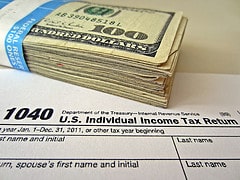
Few things are worse to think about than your tax debt. You knew that when you filed, or did not file, that taxes would be owed, or you were surprised to get a notice advising you of an underpayment and that penalties and interest are accumulating. In these situations, there are some things you can do.
Settle by Phone and Mail
First, do not procrastinate because more notices will follow and it could lead to a tax lien. One step is to call the New York Tax Department phone number on your notice and talk to the auditor or adjuster assigned to your case. You should have documentation showing that the underpayment is a mistake, if it is in error. You will likely have to write a letter explaining the discrepancy or error and include any supporting records.
You can ask the person about what procedures for protesting a tax assessment and the type of documentation required such as bank records or a cancelled check.
If the assessment is correct, make at least a partial payment with your letter or make a promise to pay.
Installment Payments
The IRS is generally amenable to having you make installment payments to pay off your tax debt over time. It prevents the IRS from liquidating your major assets such as your home or a retirement account. This option might be best if you are not currently able to pay the obligation.
There are specific IRS income and expense standards to determine an acceptable minimum monthly installment payment. It is possible that should the Tax Department or IRS not accept an installment agreement, they may refrain from levying against your bank account or wages or any other collection activities until you are on better financial footing.
If this is not possible, then an offer in compromise might be a more better alternative.
Offers in Compromise
If the underpayment or assessment is substantial, you can seek to pay only a part of what you owe through an offer in compromise. You should probably have a tax professional like a CPA or tax attorney negotiate this for you.
An offer in compromise is a commitment on your part to pay a reduced amount over a period of years. This avoids litigation expenses. The IRS will accept an offer only if there is doubt regarding collectability supported by a Collection Information Statement (IRS Forms 433-A or B) in which you must disclose your assets. There is a fee associated with the form. For liabilities over $100,000, you must provide a full credit report and your financial statement information must be no older than 6-months prior to submission of the offer in compromise.
Also, your tax returns must be current to be eligible and there can be no tax liabilities not being paid as they accrue.
Bankruptcy Protection
You might consider with the advice of a financial expert and bankruptcy attorney if filing bankruptcy is your best option. A Chapter 7 bankruptcy is a liquidation of debts, including some tax debts. A Chapter 13 is a reorganization that can result in a payment plan that includes your tax debt.
You do have to qualify for a Chapter 7 filing. If eligible, the IRS and New York Tax Department would be included as an unsecured or low priority creditor unless they filed a tax lien. For individual tax liabilities to be dischargeable, you must meet the following:
- More than 3 years has passed since you filed the tax return
- The tax return must have been filed 2 years before the bankruptcy petition is to be filed
- At least 240 days has passed since an IRS assessment
- The tax debt was not the result of a conviction for tax evasion or tax fraud
Otherwise, a Chapter 13 might be available for you to pay your debt over a period of up to 60-months. You should consult with a bankruptcy attorney or CPA before you take this step as options other than bankruptcy might be more beneficial to your particular circumstances.









